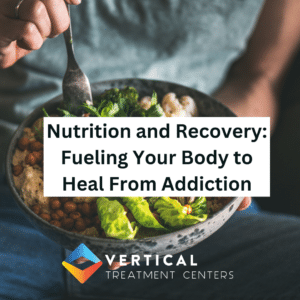
Nutrition and Recovery: Fueling Your Body to Heal From Addiction
Recovery from addiction is not just a psychological journey, but a physical one as well. The role nutrition plays in the recovery process is essential and often overlooked. This blog post aims to shed light on how proper nutrition can foster recovery and aid in rebuilding overall health. So let’s dive in.
II. The Effects of Substance Abuse on Nutritional Health
Substance abuse typically leads to poor eating habits and nutritional deficiencies. Drugs and alcohol can interfere with nutrient absorption, deplete nutrients in the body, and increase metabolic needs, leading to several health complications. For example, alcohol use can damage the liver, affecting the body’s ability to metabolize and store nutrients.
III. Nutritional Deficiencies and Recovery Challenges
Deficiencies in essential nutrients, like vitamins B and D, iron, and omega-3 fatty acids, often manifest in individuals recovering from addiction. These deficiencies can exacerbate withdrawal symptoms, hinder the body’s repair processes, and negatively affect overall health, making the recovery process challenging.
IV. The Building Blocks of Recovery Nutrition
The cornerstone of recovery nutrition includes macronutrients (proteins, carbohydrates, fats) and micronutrients (vitamins, minerals). Proteins help in repairing body tissues, while carbohydrates provide the body with needed energy. Fats promote brain health, and vitamins and minerals perform various vital functions, ranging from bone health to boosting the immune system.
V. Developing a Recovery Diet Plan
Creating a balanced diet tailored to recovery needs can seem challenging but is crucial. Prioritize meals and snacks that contain proteins, healthy fats, and complex carbohydrates, along with a variety of fruits and vegetables for vitamins and minerals. Hydration is also important, so drinking plenty of water is essential.
VI. Specific Nutritional Strategies for Recovery
Certain foods can aid various aspects of recovery. For instance, lean proteins support tissue repair, whole grains provide steady energy, and omega-3 fatty acids found in fatty fish can improve mood. Likewise, consuming antioxidant-rich fruits and vegetables can help enhance immune function and combat oxidative stress during recovery.
VII. Overcoming Obstacles to Healthy Eating
Common barriers to healthy eating during recovery may include tight budgets, lack of cooking skills, or reduced appetite. Meal planning, learning simple cooking methods, and eating smaller, more frequent meals can help overcome these challenges.
VIII. How Professional Treatment Centers Incorporate Nutrition
Many treatment centers are recognizing the importance of nutrition in a holistic recovery approach. They often integrate individualized nutrition plans and even provide nutritional counseling. Creating an environment supportive of nutritional health can significantly contribute to successful recovery outcomes.
IX. Success Stories: Transformation Through Nutrition
Countless individuals have witnessed the transformative power of nutrition on their recovery journey. From improved energy and physical health to better mental well-being, proper nutrition can indeed make a big difference.
X. Conclusion
In conclusion, fuelling your body with the right nutrition plays a pivotal role in healing from addiction. Though nutrition often takes a backseat in recovery discussions, it’s clear that nutrition is a key player in the journey to sobriety. Nourishing your body through balanced meals and healthy choices not only enhances the recovery process but also paves the way to a healthier lifestyle post-recovery. If you, or someone you know, are in recovery, consider seeking professional assistance to create a personalized nutrition plan – your body, mind, and soul will thank you.